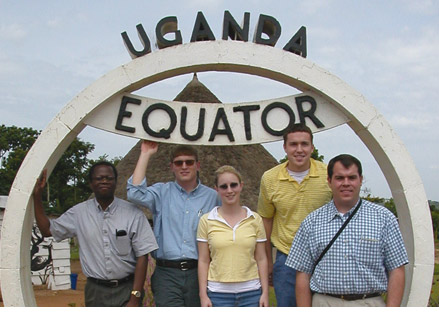


Bringing It All Back Home
by Rebecca McCarthy
Intro
|
Surviving The Amin Years
|
To Give Something Back
|
Promising Products

![]()
An Oppurtunity To Help Someone

Surviving the Amin Years
Kisaalita, 53, grew up in Nasangi, outside Kampala, in a reeds-and-mud house lit by kerosene and heated by wood. By Ugandan standards, his family was middle class. Initially, his father rode a bicycle to a government job in the capital, then bought a motorcycle and finally a car. He remembers when his family built a brick house, one of a handful in the area. He was 8.
When Idi Amin came to power in 1971, many of Kisaalita’s father’s friends—educated people who opposed the dictator—began to disappear. The Asian residents who had “kept things running” were banished, sending the country’s economy into a tailspin. Times were dreadful in Uganda.
Both Kisaalita and his younger brother, a medical student, were attending Makerere University in 1977 when students declared a strike. The police were called in, and the situation deteriorated into a riot. Students were beaten, raped, even killed.

William Kisaalita (far left) poses with students at a popular tourist attraction, a sign near Kampala that spans the equator.
“And our parents were frantic when my brother came home late,” Kisaalita said, shaking his head. “You can imagine how worried they were. But he was all right.”Small and wiry, Kisaalita becomes animated when he talks. He alternately gestures with his hands and holds them very still, as if he’s quieting unruly birds. He jumps up to retrieve papers, maps and photos to illustrate his stories.
The family survived the Amin years intact. Kisaalita graduated with a degree in mechanical engineering. His main senior-year project was a hand-powered sugar-cane mill. Even then, he was interested in getting an invention into the hands of individual producers. A local entrepreneur was going to set up a commercial operation to do just that, but the venture fell through.
The man had been one of Amin’s cronies but had to leave the country “rather suddenly,” Kisaalita said with a smile. He left too and landed in Canada, where he earned a master’s degree in bioresource engineering in 1981 before returning to Uganda to marry Rose, his college sweetheart.
But any ideas of remaining in Africa soon vanished, he said. The country was still unstable, so the couple headed back to British Columbia, where Kisaalita received a Ph.D. in chemical engineering, followed by a postdoctoral fellowship at the University of Waterloo. His research had changed direction, he said, moving from bioresources to biomedical interests.
After several postdoc positions in Canada and the United States, Kisaalita joined UGA’s faculty of engineering in the College of Agricultural and Environmental Sciences in 1991. He began developing a three-dimensional, cell-based sensing system “that will tell pharmaceutical companies whether their drugs work or not,” he said.
Intro
|
Surviving The Amin Years
|
To Give Something Back
|
Promising Products
For comments or for information please e-mail: rcomm@uga.edu
To contact the webmaster please email: ovprweb@uga.edu
![]()